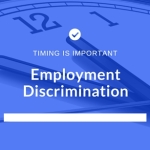When an employee is called into a meeting with his/her boss or Human Resources, panic will sometimes set in. There may have been certain events that led up to this meeting which indicate to the employee that the meeting is not likely to go well. It could be that the employee
- was already accused of some sort of misconduct or,
- the employee has been experiencing harassing and discriminatory treatment leading up to the meeting.
Either way, the employee may be wondering what his/her rights are going into this meeting, and whether or not an employee has a right to an attorney during a work meeting.
Generally speaking, an employee cannot bring his/her lawyer to a meeting at work
There is no absolute right to counsel that affords employees the right to have an attorney involved in employment matters. So long as you are an employee in Texas, your employer can require you to attend meetings with whomever they choose. This means that while an employer can choose to allow you to bring a lawyer to a meeting;
- you will generally have no right to bring one.
- you do not get to dictate to your employer that you will be bringing your attorney to the meeting
- you do not get to tell your employer that you will not attend the meeting unless you are allowed to bring your attorney
If you do refuse to attend the meeting, then your employer can (and quite possibly will) discipline you, and it may make it more difficult to pursue a legitimate legal claim.
So what do I do if I am called into a meeting at work?
If you are called into a meeting by your supervisor or HR, then you should most likely attend the meeting. You can request that a third party be present in the meeting to witness everything. This third party could be a co-worker, someone from HR, or someone from management. However, there is nothing that requires an employer to provide a third-party witness in a meeting.
In Texas, individuals have the legal right to record conversations that they are a party to. That means that you cannot be charged criminally for recording a conversation that you are a party to. However, employers may still have policies that prohibit employees from recording any conversations at work. It is important to first refer to your employers policies and procedures (e.g. employee handbook) to see if there is any prohibition of that sort. If not, then you may want to consider recording the meeting to document everything that is said.
If you are called into a meeting by your employer and you believe that they are preparing to terminate your employment or otherwise discriminate against you in some fashion, you may want to first reach out to an employment attorney to discuss your situation. While you generally will have no right to bring an attorney to this meeting, an attorney may be able to provide you with certain advice to better prepare you for the meeting. Additionally, if given enough notice, an attorney may be able to reach out to your employer’s legal counsel prior to the meeting date to present them with certain legal claims.









